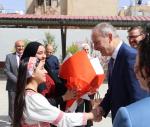You are here
Features of new IMF programme
Apr 24,2016 - Last updated at Apr 24,2016
Jordan is about to start a new economic reform programme, sponsored by the International Monetary Fund (IMF), for three or four years.
Minister of Finance Omar Malhas and the governor of the Central Bank of Jordan, Ziad Fariz, started to prepare the public opinion and shed light on the main objectives and requirements of the programme, to educate the public opinion.
The previous IMF economic reform programme (2012-2015) used to focus mainly on the fiscal and monetary policies. The Ministry of Finance and the Central Bank used to represent the government in dealing with the IMF.
The case may be different with the coming programme. There are practically no measures that will be required of the Central Bank, as things there cannot be better, but this does not mean that the entire burden will fall on the shoulders of the Ministry of Finance alone.
The programme will, of course, do something about the budget deficit and the rising public debt, but it will be more far reaching.
It will deal with other government centres that used to be excluded from the objectives and measures of the programme.
This time around, there will be reform sections addressed to the ministries of labour, energy and water.
The new programme will put extra efforts on the role of women in the labour market.
The IMF mission noticed that the rate of women participation in the labour force is too low, far below the level of social and economic development attained by Jordan.
Unemployment, vocational training, rehabilitation and increasing the number of nurseries to help working mothers are some issues intended to be an integral part of the comprehensive reform.
The new programme will deal with water and electricity tariffs, to achieve cost recovery, while protecting the poor and low-income groups of society.
It will deal with several fiscal rules, regulation and laws. Prominent among them are the income tax and budget laws.
The prime minister will of course be in the picture, being the authority of last resort in all areas subjected to reform measures.
However, the minister of finance will be the government representative in dealing with the IMF, as all related sectors have much to do with the budget one way or another.
He will be the point man in all contacts and negotiations with the IMF, whether taking place in Amman or Washington DC.
Even though Omar Malhas is a newcomer to the government, he was able to grasp the whole picture and put himself in charge.
The minister of finance is not a media expert, but he has the power of convincing, which is the instrument needed in dealing not only with the IMF but also with the public opinion.
This being the case, one guesses that Malhas will continue to head the Ministry of Finance for years to come.
The success of the IMF reform programme in achieving its objectives will serve the Jordanian economy and rid it of undeniable distortions and weaknesses.
The programme is also needed to help gain the confidence of donor countries.
In fact, an IMF programme was mentioned by the London donors’ conference when discussing Jordan’s needs for financial support to withstand the heavy burden of receiving hundreds of thousands of Syrian refugees.













